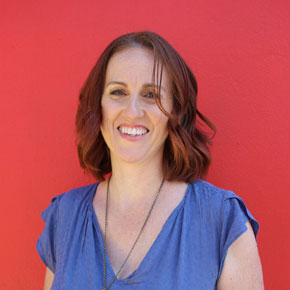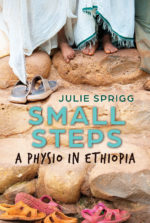Julie Sprigg – City of Fremantle T.A.G. Hungerford Award Shortlist

Read an interview with City of Fremantle T.A.G. Hungerford Award shortlisted writer Julie Sprigg plus an extract from her memoir, Chewing Porridge.
Describe your manuscript in your own words.
Chewing Porridge is the memoir of Julie, an idealistic physiotherapist from Perth, who sets off to work in Ethiopia. Julie is convinced the world could be a better place if everyone just tried harder. While volunteering as a physiotherapist for children with disabilities in a convent clinic, she gets the nuns offside with her misplaced enthusiasm, but, undeterred, volunteers at a local university hospital to teach in the country’s first physiotherapy degree. Each chapter is centred around a different child patient, recounting stories of orphans who learn to play again despite extensive burns, of children walking home from hospital after life-threatening illnesses, of those children paralysed with tuberculosis of the spine, too poor for hospital but diligent with their therapy at home. These stories of fragility and resilience are woven together with the narrator’s emotional journey as she tries to make sense of her own powerlessness in the face of poverty, injustice, war and bureaucracy. It’s a story about the fragility of idealism held up against complex realities, and the pain that accompanies the gaining of wisdom.
What inspired you to write it?
I was initially inspired to write the notes that became the first draft as a way of making sense of what I was seeing during the day while I was working as a physiotherapist for kids with disabilities in Ethiopia. I was completely engulfed by the scale of the problems, and felt so powerless that my only coping mechanism was to come home at night and write about it, to digest and synthesise my experiences. I was so baffled by this sense of enormity, I thought if I could construct some meaning from it on the page, that might quell the growing sense of existential despair. At the end of two years I had a huge amount of notes, and when I came back to Australia and reviewed my writing, I saw a very strong theme of fragility and resilience, so I set about constructing a narrative, pulling together the stories of the children I worked with. In that process I realised the narrator had a similar story of vulnerability and tenacity, which I suppose we all have, to varying degrees – it’s what makes us human. So a story emerged about being human, and about failing to live up to our own expectations.
How long have you been working on it?
I worked on the manuscript intermittently for nine years, with two blocks of solid work at the start and at the end. In 2008 I started the process of turning my notes into the first draft of a story, and completed that in 2011. Then I was only able to work on it intermittently over the next three years, with a gruelling international work schedule while also studying for a master’s degree. After relocating back to Perth from Melbourne in 2014 I dedicated all my free time – my weekends, evenings and holidays – to what felt like endless redrafting, until I was satisfied with a final manuscript in 2016.
What does it mean to you to make the shortlist of the 2018 City of Fremantle T.A.G. Hungerford Awards?
I received the call about the shortlist in the car, on the way to a family holiday in the small town of Boyup Brook (that town makes an appearance in the manuscript). We had to pull the car over on a country road as we were almost out of mobile range, so I took the call beneath some huge gum trees next to a paddock of sheep, with a grizzling toddler and a ten-year-old in the back seat. I was elated, and there may have been a little cheering and some high fiving. My ten-year-old friend summed it up perfectly when he whooped and said, ‘Does this mean you’ll get a gold sticker on the front of your book?’ Being shortlisted for a literary award is like a metaphorical gold sticker – it’s a recognition for the time, effort and pain that goes into writing a manuscript. I spent so much time locked away with only my laptop and a highly vocal inner critic proclaiming this to be a waste of time, that no one would ever read a book about physiotherapy in Ethiopia. To have a panel of judges declare my book worthy of reading and sharing is the ultimate validation. I feel honoured and so very excited.
From Chewing Porridge: Fixing Up and Breaking Down in Ethiopia by Julie Sprigg
To Walk: በግርመሄድ/bageur mehead/
The next morning’s patient was already there when I got to work. I sat next to him where he lay on the thick vinyl mat on the floor. Yeshe slipped off her mules and sat cross-legged next to me, arranging her long skirt over her bare legs. The other ten workers formed a circle.
‘He name Ammanuel. Four years old,’ Yeshe translated from the boy’s mother, who perched on the edge of a chair.
I tried hard not to look surprised. This four-year-old was the size of an 18-month-old, with an enlarged head and emaciated, flaccid limbs. He didn’t look at me when I picked him up, instead his eyes glazed. He wore no nappy, only a shirt I guessed had once been white but was now brown and stiff with dirt and urine. When I picked him up to sit him in my lap the shirt lifted to reveal a tiny withered body with legs dangling from soft hips. His mother’s outfit was speckled with holes and the neckline of her shirt had disintegrated and split in two. The skin on her face and hands was dirty, dry and cracked.
The child and his mother smelt of rotten vegetables and while they explained their situation, I pretended to scratch under my nose to block the smell.
Yeshe translated that Ammanuel had spent the first four years of his life tied to his mother’s back, whenever she was at home or walking somewhere. She always tied him to look over her right shoulder. Now I saw how the muscles on one side of his back had shortened and stiffened, which had caused a lopsided curve in his spine.
‘Has she ever taken him for physio?’
Yeshe translated for us. ‘Never. There is no place for physiotherapy. Just to come to small projects like this one.’
I asked if he ever lay on his tummy.
‘Not ever lying on stomach. Only lying on back. When she wanting for resting her back, she is lying him on the bed.’ Yeshe translated and then asked, ‘Do you think he’ll learn to walk?’
Ten rehabilitation workers peered in to hear my answer. Having never seen a child in such a state before, I was overwhelmed and didn’t know how to answer. Instead I said, ‘Let’s do an assessment and discuss what we find.’
I tried standard paediatric physio assessments and saw that when I rattled a toy in front of him he wasn’t able to focus his eyes on it. He couldn’t turn his head to follow the toy when I shook it at the side. Although old enough to be a pre-schooler, he had the development skills of a very young baby. When I put him on his tummy he lay there motionless, not making a sound. As I picked him up a trickle of his urine went on to the treatment mat.
‘Yikerta, Yikerta, excuse me excuse me,’ his mum dabbed at the puddle with his tiny knitted hat.
‘No matter,’ Yeshe said in English and repeated the message to his mum in Amharic. When I sat Ammanuel on my knee his head sunk as if too heavy for little body. As his head lolled to one side saliva dripped from the corner of his mouth. His mum dabbed at it with the hat, the same hat she would later put on his head when it was time to go. I was appalled with each new abuse of the hat, but taking my cue from the workers who mentioned nothing to the mum, I too kept quiet.
Therapy for a child with this degree of disability would be a challenge anywhere, but here it seemed impossible. My first thought was that he should receive a wheelchair so his mum needn’t carry him everywhere.
‘Does anyone use a wheelchair here?’ I asked Yeshe.
She replied, ‘It is difficult, who can push a wheelchair up these roads?’
The roads were so rocky and on such impossible gradients that a wheelchair would be of little use. I put the idea of a wheelchair aside and showed his mum some exercises to do. She said they would come again the next day.
Ammanuel’s mum bought him in for treatment again the next day and every day that week. By the Thursday of the second week he focused his eyes on a rattle when I shook it above him and began to be more responsive. It was a good sign — developing control of the eyes is the first developmental stage. As I waved goodbye to Ammanuel, who looked snug tied to his mother’s back, I wondered if he could develop control of his eyes within a week, what other improvements might he make?



